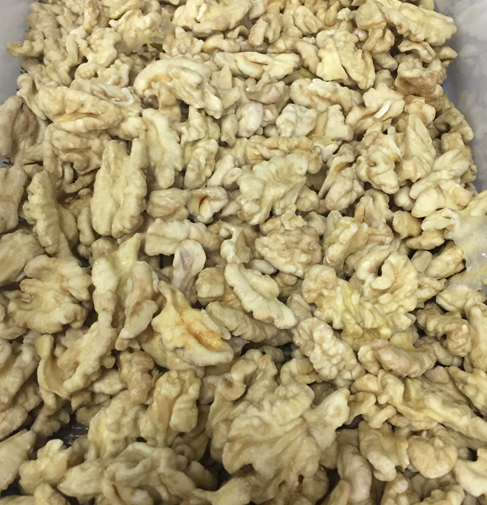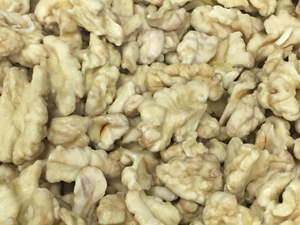Ripening walnut kernel with microwave vacuum expansion dryer
2019/1/6
Walnut kernel microwave vacuum expansion dryer

Walnut, also known as walnut and Qiang peach, is a plant of walnut family. Together with almonds, cashews and hazelnuts, they are known as the world"s famous "four dried fruits". Walnut kernels are rich in nutrients, including 15-20 grams of protein per 100 grams, more fat, 10 grams of carbohydrates, and a variety of essential trace elements and minerals such as calcium, phosphorus, iron, as well as carotene, riboflavin and other vitamins. Good for human body. It is one of the nuts that are popular among the people.
Walnut, which likes light, cold, drought and disease resistance, can adapt to the growth of various soils, likes fertile and moist sandy loam, likes water, fertilizer and sunshine, and has no strict requirements on water and fertilizer. Suitable for most of the land. Walnut likes calcareous soil, which is common in places with deep soil layer on both sides of mountain valleys.
Walnut processing process steps
1. Exfoliate
Walnuts began to mature from late August to early September. At this time, the pericarp changes from dark green to yellow-green or light yellow, and part of the involucre cracks and a few fruit drops, which can be harvested for processing. Green walnuts should not be exposed to the sun. Sun-dried walnuts are not easy to peel. Walnuts should be stacked in a cool place or indoors with a height of 30-50 cm and covered with walnut leaves or grass. After 3-5 days, when the green skin leaves the shell, it is peeled off manually or cut with a knife. Generally, 4.5 kg of walnuts can yield 1 kg of dry walnuts.
2. Rinse and dry
Rinse with water in time after peeling, because the vascular bundle at the base of walnut will shrink after a long time, and the cleaning water will easily enter the shell, making the kernel discolor or even decay. Put the walnuts in the basket and put them into the water. Stir them with a bamboo broom for 5 minutes each time. Wash 2-3 batches of walnuts and replace them with water. Wash the mud and black dirt on the shell surface of the wet walnut, and then bleach it. Add 1 kg of bleach powder and 6-8 kg of warm water, dissolve and filter the residue, then add 60-80 kg of water to dilute into bleach solution. After putting the bleach into the walnut, stir it constantly, and take it out when the shell changes from blue-red to yellow-white. Rinse it repeatedly with water to remove the white spots of the residual bleach until it is light white. Bleaching is carried out in a vat. Do not use an iron bucket to prevent the walnut shell from turning turquoise. Rinse 80 kg walnuts for 8-10 minutes each time. After the walnuts are removed, add another 0.5 kg of bleaching powder into the bleaching solution and reuse it for 7-8 times. Walnuts can be shady and cool for half a day after bleaching, and can be dried at a temperature of 40C-50 "C after spreading after some water evaporates. The sign of drying in the sun is that the color of the seed coat changes from milky white to light yellow brown, and the diaphragm is easy to break. Dry walnuts should be stored in a ventilated and dry room.
3. Kernel extraction
When taking kernels by hand, place the walnut suture parallel to the ground and strike evenly with force. Do not strike hard or repeatedly. Generally, 38 kg of kernels can be taken for every 100 kg.
4. Soak in fragrance liquid
Mix 20% of the bark, 5% of the clove, 25% of the cumin, 20% of the licorice, 15% of the star anise, and 10% of the Chinese prickly ash and 5% of the fragrant slices, add 10 times the amount of water, heat it to boiling, keep it warm for 30 minutes, and filter out the extract. Add 2-5% salt and 0.03-0.05% monosodium glutamate into the extract. Immerse the walnut kernel in the flavoring liquid prepared by the above method for 1 hour, remove and drain.
5. Drying and maturing
Put walnuts into a special PP mesh plate, each plate is 15 kg, and each vehicle is 12 plates, which can be put into 24 boxes at a time, and can be fed into 200KG at a time. The drying time is 1-2 hours. Dry the soaked walnuts at a temperature of 60C-70C until the moisture content is less than 10%.
Youshengda Microwave Technology (Shanghai) Co., Ltd Copyright ICP:2023002225-1 Disclaimer

